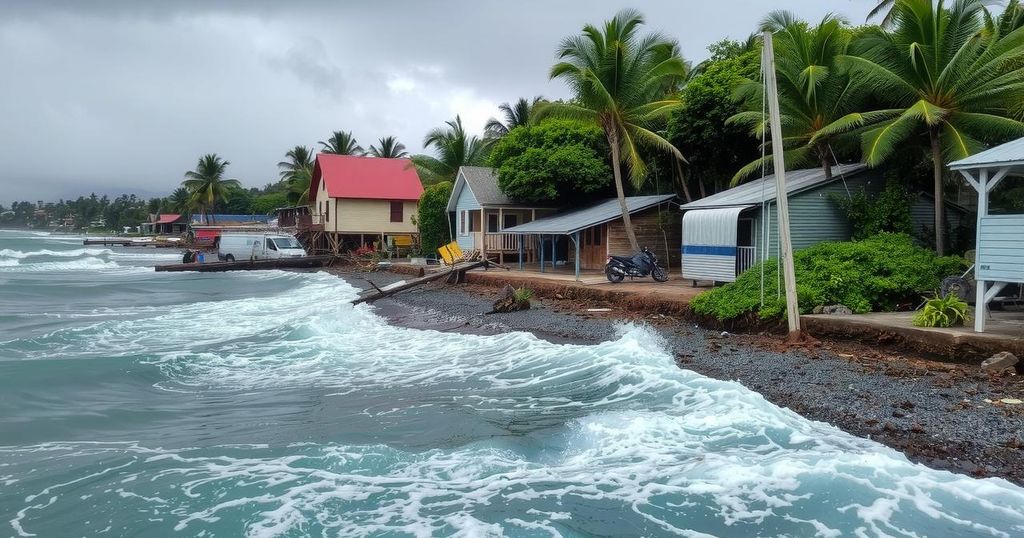Mayotte Faces New Crisis as Tropical Storm Dikeledi Strikes Amid Ongoing Recovery Efforts
Tropical Storm Dikeledi has struck Mayotte, intensifying the struggles of a territory still recovering from Cyclone Chido’s devastation. With heavy rains and strong winds, residents are urged to prepare for significant disruptions. The repeated storms underscore the island’s vulnerabilities and the socio-economic challenges faced by its population, necessitating urgent international aid for sustainable recovery efforts.
The French territory of Mayotte, an archipelago in the Indian Ocean, is currently under a red alert as Tropical Storm Dikeledi wreaks havoc on a region still reeling from the devastating effects of Cyclone Chido. The storm’s heavy rains and fierce winds have prompted the local government to advise residents to remain indoors in anticipation of prolonged disruption. Just weeks after Cyclone Chido caused significant devastation, resulting in 39 fatalities and injuring over 5,000 individuals, Mayotte’s infrastructure is once again under severe strain.
Mayotte, recognized as one of France’s most economically disadvantaged regions, has encountered numerous tropical storms, yet the recent series has laid bare the vulnerabilities of its disaster preparedness systems. Cyclone Chido, which made landfall in December, was the most severe storm to strike Mayotte in nearly a century, leading to extensive property damage, power outages, and the troubling issue of approximately 200 individuals still unaccounted for. The arrival of Tropical Storm Dikeledi has compounded the existing challenges, resulting in further flash flooding and uprooting efforts to restore normalcy in the aftermath of the previous cyclone.
In response to the escalating crisis, the Mayotte government has outlined emergency protocols instructing residents to gather essential supplies and seek safer shelters. Aid organizations and local officials are actively engaged in relief efforts aimed at supporting affected communities. However, the logistical challenges of delivering international aid to this geographically isolated region remain significant, emphasizing the urgent need for a sustainable disaster management strategy.
The repercussions of recent storms have sparked renewed discussions on the vulnerability of small island territories to climate change, highlighting a troubling increase in both the frequency and intensity of tropical storms in the Indian Ocean. The socio-economic difficulties confronting Mayotte—marked by high unemployment and inadequate healthcare—exacerbate the impact of natural disasters, leaving the community struggling to rebound.
As Mayotte navigates its path towards recovery, it must not only address immediate relief efforts but also prioritize the building of long-term resilience. The international community’s support, through financial assistance and technical expertise, is essential in helping Mayotte and similar vulnerable regions counter the adverse effects of climate change. The experiences of the people of Mayotte underscore the necessity for global cooperation in developing climate resilience measures, offering hope for a more sustainable future.
In conclusion, the dual impact of Cyclone Chido and Tropical Storm Dikeledi illustrates the critical challenges facing Mayotte as it confronts ongoing natural disasters. The resilience displayed by the Mayotte community, coupled with coordinated assistance from local authorities and international partners, holds promise for recovery amidst a daunting landscape of adversity.
The article discusses the current challenges faced by Mayotte following the impact of Tropical Storm Dikeledi, which has exacerbated the already dire situation caused by Cyclone Chido in December. Mayotte, known for its picturesque landscapes, struggles with infrastructure inadequacies highlighted by repeated severe weather events, drawing attention to the region’s economic vulnerabilities and disaster preparedness limits. The article emphasizes the need for international support and the importance of robust disaster management strategies in the face of climate change-related threats that disproportionately affect small island territories.
In summary, Mayotte is facing significant challenges due to the dual impact of Tropical Storm Dikeledi and Cyclone Chido, which has revealed the region’s vulnerabilities and the pressing need for improved disaster preparedness. While local authorities and aid organizations are working to address immediate needs, there is an urgent requirement for international assistance to ensure a more sustainable recovery. The resilience of the Mayotte community, combined with coordinated efforts, is essential for overcoming the trials posed by these environmental adversities.
Original Source: www.travelandtourworld.com




Post Comment